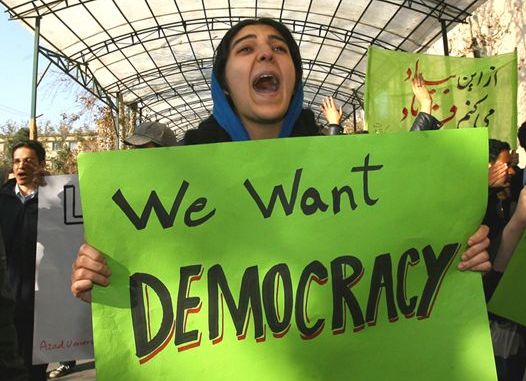Many of Israel’s ardent defenders would sooner point to injustices taking place in other Middle Eastern countries than entertain the idea of having a discussion about what the Jewish State is doing right and what it is doing wrong. Israel is the only democracy in the Middle East, the argument goes. In a region of 392 million people, only the 8 million citizens of Israel are guaranteed the rights to democratic governance, rule of law, and free expression. Factually speaking, this argument is accurate. But it’s not really very useful.
Freedom House — an American NGO that promotes global freedom — categorizes each country in the world as free, partially free, or not free. According to their map of the Middle East, 15 countries are designated as “not free.” Kuwait, Lebanon, Tunisia, and Morocco are designated as “partially free.” Israel is the only “free” country on the map.
Thus, according to the argument quoted above, Israel’s relative impunity is dependent upon its neighbors’ subpar civil and human rights records. The shortsightedness of this hasbarah tactic was first exposed during the earlier, more Spring-like moments of the “Arab Spring.” Tunisia had already emerged from its popular uprising with new democratic structures intact, and Egypt seemed to be following a similar path. Soon, Israel would no longer be the only democracy in the Middle East, and Israel’s uniqueness as a stronghold of freedom in a region run by oppressive despots would quickly dissipate. Moreover, Israel’s problematic relationships with its minorities and non-citizen residents would only become more shamefully apparent as civil rights ceased to be a novelty in the Middle East.
To illustrate the anxiety that pro-Israel activists may have felt (and perhaps should feel now) as other Middle Eastern countries open up to democracy, I will point to another part of the world where democratization is also making headlines. Since 2010, Burma (Myanmar) has steadily been transforming from one of the most repressive, undemocratic nations of the world to a developing democracy worthy of American and European investment. In fact, in April 2012, President Thein Sein held the country’s first democratic, internationally monitored by-elections, in which the National League for Democracy (led by Nobel Peace Prize-winner and opposition leader Aung San Suu Kyi) won 43 of 45 available seats. President Thein Sein has also complied with American transparency stipulations in order to secure foreign investment, and his government has removed numerous restrictions on the Burmese press.
All of this positive attention toward a country that was so recently best known for its pariah status being on par with that of North Korea leaves the world in search of a new bête noire. For this, Burma’s Southeast Asian neighbors provide an extensive menu. In an article for World Politics Review, analysts Loc Doan points out that Burma’s steps in the right direction have shifted the international crosshairs onto other countries such as Singapore and Cambodia — autocratic regimes that are democratic in name only — and Brunei, Laos, and Vietnam, where democracy is still a taboo subject, and ruling parties forbid the existence of any opposition. Even democratic countries such as Indonesia, Malaysia, and the Philippines are more heavily monitored now that Burma is no longer the region’s primary problem.
But the shift in focus doesn’t end there. Now that Burma is raising its democratic standards, it is being held to them. That is why, after decades of allegedly state-sanctioned persecution, the plight of the Rohingya Muslims in northern Burma is finally receiving widespread international attention, forcing Burma to reform more thoroughly than it had originally intended.
In a world where civil and human rights matter, countries are held to certain standards largely based on their own statements about their commitment to these principles and based on the comparability of their humanitarian records to those of their neighbors. Israel’s relationship with the Palestinians has long been subject to international scrutiny because it doesn’t match up to Israel’s portrayal of itself in nationalist media. Now, just as Southeast Asian countries are being put on the spot by the performance of their repentant neighbor, Israel might have to answer for its waning uniqueness as a Middle Eastern democracy, especially given the country’s current confusion as to how to treat its African refugee population, its failure to extend the freedom of worship to all women, and rising “pro-apartheid” sentiments within Israeli society. Does the pro-Israel establishment already have its sound-byte prepared?
If not, I propose we drop the finger-pointing altogether. All states are worthy of criticism whether or not they are situated in pleasant international neighborhoods, and it is our responsibility to criticize them. If we conveniently rely on our neighbors’ failures to absolve our favorite countries of the injustices they commit, then not only do we profit from the misfortune of our fellow regional stakeholders, but we also fasten ourselves to the sinking ship of a flimsy conditional argument. Instead of relying on “our” status quo being better than “their” status quo, every patriot should actively work toward democratic reform and strengthening those freedoms that make our countries of choice — whatever they may be — worthy of praise. The way forward is not by distracting critics, as so many countries habitually do, but by heeding legitimate criticism and enacting positive reform.
____
Please note: the opinions expressed by the author do not necessarily reflect the views and opinions of Ha’Am Newsmagazine.


Interesting articles on information like this is a great find. It’s like finding a treasure. I appreciate how you express your many points and share in your views. Thank you.
[url=http://monclerjackets2013.webnode.fr/]moncler jackets[/url]
moncler jackets
Hello there, I found your web site via Google while looking for a related topic, your website came up, it looks great. I have bookmarked it in my google bookmarks.